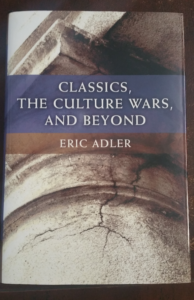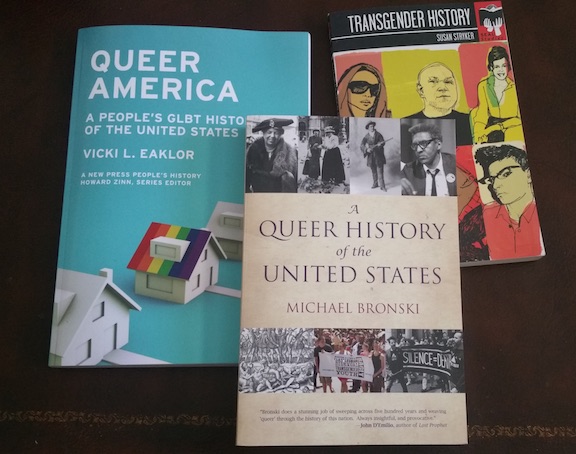Last night I finally closed the books on the 2016-2017 academic year. I graded my last batch of finals and turned in grades for my last section at the community college. Spring semester started a week earlier at the university than at the community college, so I was “done” with school once already this month. But now I’m really done – and all but done in. So today’s blog post is going to be a grab-bag of links, questions, recommendations and provocations. (Come for the links, stay for the provocations!)
Speaking of grab bags…if you are looking for a sturdy, durable, practical, reasonably affordable and not unattractive book bag, here’s my recommendation
.
If you are looking for some insight into the recent “free speech” controversies on college campuses, do not overlook the crucial role played by right-wing donors.
[Y’all: Well, that escalated quickly!]
 Speaking of campus culture wars…This piece by Megan Daniels takes another look at the controversy surrounding Martin Bernal’s Black Athena. First published in 1987, Bernal’s book mapped out the territory for a crucial site of conflict during the campus culture wars.
Speaking of campus culture wars…This piece by Megan Daniels takes another look at the controversy surrounding Martin Bernal’s Black Athena. First published in 1987, Bernal’s book mapped out the territory for a crucial site of conflict during the campus culture wars.
Classics, the Culture Wars, and Beyond, a new book by Eric Adler, explores the relationship between classical studies and the culture wars in great depth and detail. I will have more to say about this book in a later post. For now, let me leave you with these two intriguing paragraphs from the last page of the introduction:
To a greater degree than most works of classical scholarship – or even examinations of the discipline’s history – Classics, the Culture Wars, and Beyond analyzes conflicts with glaring ideological resonances. Since the book endeavors to provide dispassionate assessments of these disputes, it seems necessary to offer a brief word on my political views. I do not mention this topic out of a misguided impression that readers care about my biography, and I hope that my few words on the matter will not appear self-indulgent. But I think it is only fair for me to come clean on the subject, since it may help readers judge the degree to which my outlook affects my analysis.
In fact, I hope that my varied political background suggests that I am a good candidate to write this book. My inclinations have shifted over the years, from garden-variety American liberalism, a short-lived flirtation with radicalism, a center-right phase (during which time I worked briefly as an editor for the New Criterion, a journal discussed in chapters 1, 2, and 4), and most recently a push toward moderation. These days, I consider myself a centrist. Although I do not believe that this personal history allows me to write objectively about the contentious topics discussed in this book, I hope that it helps me give a sympathetic hearing to various opposing arguments.
This is an interesting methodological and ethical statement, and it raises the question: What is a sympathetic hearing, and is it always a desideratum for historical writing?
And speaking of questions…
On every final exam, I always offer some version of this two-part essay question (among other options):
What was the most important thing you learned about U.S. history this past semester that you didn’t already know, and how has it shaped or reshaped your understanding of American history? What was the most important thing about U.S. history that you wish we had covered in more depth or detail, and how would that impact students’ overall understanding of the American past?
It’s actually not an easy question, but it’s an interesting one for many of my students, and their answers are of great interest to me. This semester I didn’t ask my students’ permission to share their writing in an online forum, so I will not excerpt any of their replies here. However, I will note one topic that several of my students thanked me for covering, while at the same time wishing I had covered in more depth and detail: queer history. (Needless to say, there’s not a lot of queer history taught in the K-12 schools here in Texas.)
So I am currently reading Michael Bronski’s A Queer History of the United States, trying to decide if this would be a good “starter” text to recommend to undergrads. I’m just a couple of chapters in, but it seems like a serviceable if somewhat idiosyncratic text. However, if you have any recommendations for another good overview text on queer history in the U.S., I’d be very grateful. (Next up on my reading docket, as you can see from the photo above: Vicki L. Eaklor’s Queer America
and Susan Stryker’s Transgender History.)
And that’ll do for a blog post for today. It’s sunny here in Texas, the semester is finally and fully over, and the poolside lounge chairs beckon.



6 Thoughts on this Post
S-USIH Comment Policy
We ask that those who participate in the discussions generated in the Comments section do so with the same decorum as they would in any other academic setting or context. Since the USIH bloggers write under our real names, we would prefer that our commenters also identify themselves by their real name. As our primary goal is to stimulate and engage in fruitful and productive discussion, ad hominem attacks (personal or professional), unnecessary insults, and/or mean-spiritedness have no place in the USIH Blog’s Comments section. Therefore, we reserve the right to remove any comments that contain any of the above and/or are not intended to further the discussion of the topic of the post. We welcome suggestions for corrections to any of our posts. As the official blog of the Society of US Intellectual History, we hope to foster a diverse community of scholars and readers who engage with one another in discussions of US intellectual history, broadly understood.
Also check out Leila J. Rupp’s A Desired Past—I’m interested to hear what you think of Eaklor, since I’ll probably assign it this fall.
Dan, thanks for this rec — will check it out. I’ll let you know on Eaklor.
On Bronski, here’s my frustration: the broad-brush sketch of U.S. history in which he frames queer history (or maybe vice-versa) is, in my view, off. It’s not necessarily “queered”; it’s just disconcertingly off in places. But I can course-correct for that while drawing on his narrative to deepen discussion of queer history through both halves of the survey.
I’m almost certain that I read Bronski at some point, but can’t remember exactly what I thought of it. However, what you said probably sums it up in that the “A [blank] History of the United States” usually have interesting content but can be pretty generalizing and ahistorical in their overarching frameworks.
On Adler including his own politics as a way to frame his book on the culture wars over the classics for his readers: maybe, since he is a centrist, this is a way to anticipate and cut off any possible left and/or right criticism. But I doubt it will work given the topic. I speak from experience as someone who has written a book on the culture wars. As a left-winger I received criticism from some conservative reviewers who didn’t think I was fair to my conservative subjects and criticism from some left-wing reviewers who thought I was too fair to my conservative subjects. It’s a topic that attracts critics and there’s no way around that.
Good insights, Andrew. Duly warned & duly noted!
What struck me was the implication that since he has “been” all these things, he can give “a more sympathetic hearing” to the various positions. That’s possible, surely — but not necessary, in two ways: it’s not necessary to have “been there” to write about it with sympathy, and it’s not necessarily the case that someone who has been there will write with sympathy.
Bonus link! A brief bleg re: think-pieces that have focused on “identity politics” in the 2016 election.